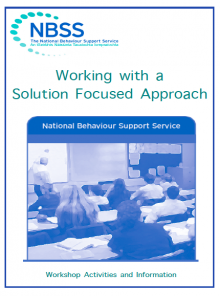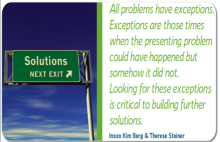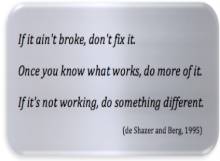The NBSS applies a solution focused approach to its work. Solution focused thinking in education can be applied to all aspects of school life - from promoting and reinforcing positive behaviour, addressing bullying issues, to the running of effective meetings. By focusing on the positive resources and skills inherent in all schools a solution focused approach can enhance the educational and workplace experience for all members of the school community.
There are three key principles to working in a solutions focused way:
- If it ain't broke, don't fix it.
- Once you know what works, do more of it.
- If it's not working, do something different.
(de Shazer and Berg, 1995)
Solution focused thinking or a solution focused approach holds that as problems do not happen all of the time, a positive way of working is to discover what is working well and then to do more of it. Rather than dwelling on deficits or the history of the problem, a solution focused approach looks to the strengths and resources a person, team or organisation possess and how these can be applied and used to construct potential solutions. From this perspective the focus naturally shifts away from problems and gravitates towards useful solutions. As an adaptable approach solution focused principles are now applied across a range of contexts, for example health, education, community and social care sectors as well as the business and corporate sectors.
Solution Focused Strategies
A solution focused approach entails asking effective questions, rather than using leading questions such as “Why don't you ...?”, or “Have you thought of ...?”. The following are examples of solution-focused questions and strategies:
- Building on success – strategies to help people focus on what they’re doing well rather than what’s going wrong.
- Exception finding – asking when a problem or difficulty happens less or less intensely. This gives information about what skills and strengths the person is able to use at least some of the time, e.g. Is there a time when the behaviour doesn’t occur, or occurs less often?
- Future focused – is a means of visualising life without the problem and can lead to setting relevant and meaningful goals, e.g. Suppose in your next maths class you're at your very best, what will you be doing differently? How will others know? What will they see, hear, that will be different? Or imagine it is time for you to go home and you are feeling satisfied with your day. What have you been doing during the day?"
- Scaling – is a way a of ascertaining the person’s perception of him or herself and the problem at present. This helps identify what’s going well and to focus on where the person wants to get to by moving one point on the scale, e.g. On a scale of 0-10 where 10 equals you at your very best, where are you now? What have you done so far to get to there? What else? What would move you one point up the scale?
The NBSS supports schools in developing solution focused approaches and using solution focused strategies for positive behaviour improvement at Level 1: school-wide for all students, Level 2: targeted intervention for some students and Level 3: intensive, individualised support for a few students.
Since 2008 the NBSS has provided partner schools with training in solution focused thinking and approaches. Interested school staff including Behaviour Support Classroom teachers, Behaviour for Learning Programme teachers and Year Heads have attended two-day courses where they have explored the basic principles and techniques of solution focused thinking and practice. Through lectures, group work, recorded examples and exercises the courses aim to provide teachers with sufficient knowledge and practice to try out at least some solution focused techniques in their schools. Participants are given many opportunities over the two days to practice solution focused interviewing skills such as:
- Problem free talk
- Exploring a preferred future
- Eliciting what is already working
- Using scaling questions
- Highlighting change
- Solution focused summaries
Additionally, all teachers are provided with a manual to support their practice as well as ongoing support and advice from NBSS team members, who are also trained in solution focused practices.



